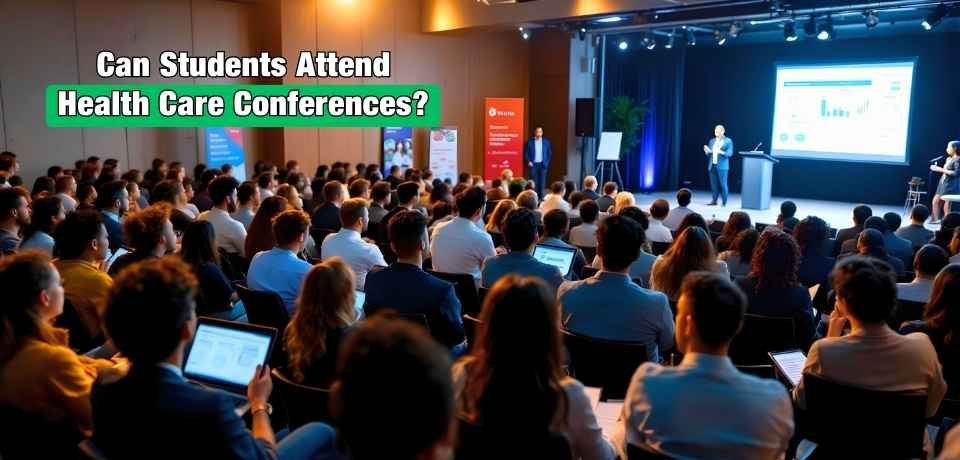Health care conferences are vital events that bring together professionals from various sectors of the medical field. These events focus on sharing knowledge, discussing innovations, and exploring advancements in health care. Now you might be wondering, “Can students attend health care conferences?”
Yes, students can attend health care conferences, and many are specifically designed to encourage student participation. Numerous conferences offer discounted rates for students, making it financially accessible. These events provide valuable opportunities for learning, networking, and professional growth.
Are you curious about how attending these conferences can benefit you as a student? If so, continue reading this article to discover essential information about the significance of health care conferences and how they can improve your educational journey and future career in health care.
Significance of International Health Care Conferences for Students
International health care conferences hold significant value for students pursuing careers in the medical field. These events provide a great opportunity for students to learn about global health trends, research, and innovations. By participating in these conferences, students can gain insights into practices from different countries and cultures, broadening their knowledge of health care on a global scale.

Moreover, these conferences often feature renowned speakers and experts who share their knowledge and experiences. Attending sessions and workshops allows students to engage with cutting-edge research and the latest advancements in health care. Events like health care conferences in Canada attract a diverse group of attendees, providing students with the chance to connect with professionals and peers from various backgrounds.
Additionally, international health care conferences create networking opportunities that can be invaluable for students. Building relationships with industry leaders and fellow students can lead to mentorship and future career opportunities. So, these conferences are instrumental in influencing the careers of aspiring health care professionals.
Can Students Attend Health Care Conferences?
Students can indeed attend health care conferences, and many organizations encourage their participation. Various health care conferences actively seek to engage students by offering discounted registration fees or special student rates. To attend a health care conference, students typically need to register in advance. You should check the specific requirements for each event, since they may differ.

Registration Process
For students looking to attend health care conferences, understanding the registration process is essential. By following these steps, you can ensure a smooth and successful registration experience. Here’s how to get started:
Research Conferences
Start by researching upcoming health care conferences. Look for those that align with your interests and areas of study. Websites, social media platforms, and industry newsletters are excellent resources for finding relevant events. Ensure the conference is open to students and check for any specific student sessions.
Review Registration Details
Once you find a conference of interest, review the registration details. Look for information about student discounts or special pricing. Some conferences may require proof of student status, so be prepared to provide documentation if necessary. Planning accordingly will be easier if you understand the costs and requirements.
Complete the Registration Form
After confirming that you meet the requirements, complete the registration form. Fill in all necessary information, such as your name, school, and program. If required, upload any necessary documents that prove your student status. Double-check your information before submitting it to avoid any issues later.
Plan Your Attendance
After registering, plan your attendance. Review the conference agenda and select the sessions or workshops you want to attend. Make a note of any keynote speakers you wish to hear from. Planning your schedule will help you make the most of the experience.
Financial Considerations
Consider the financial aspects of attending a conference. While many conferences offer discounts for students, there may still be costs associated with attending, such as travel, accommodation, and meals. Some schools have funds or grants to support students attending conferences. Check with your academic department to see if financial assistance is available.
Making Connections
Attending health care conferences can be an excellent opportunity to network with professionals in the field. Engaging with fellow attendees can lead to valuable connections that may benefit your career in the future. Be proactive in introducing yourself to others and participate in networking events that may be part of the conference.
Professional Development
In addition to networking, attending conferences allows students to engage in professional development. Many conferences include workshops and sessions that focus on specific skills relevant to health care. This hands-on experience can upgrade your resume and give you a competitive edge in the job market.
Benefits of Attending Health Care Conferences as a Student
Attending health care conferences as a student offers numerous benefits that can significantly impact your education and career development. These events are designed to provide learning experiences, networking opportunities, and insights into the health care field. Here are some key advantages of attending.
Access to Cutting-Edge Knowledge
One of the main benefits of attending health care conferences is the access to the latest research and knowledge in the field. Conferences often feature presentations and discussions led by industry experts who share their findings and insights. This exposure helps students stay informed about current trends and advancements in health care.
Networking Opportunities
Health care conferences are excellent venues for networking. Students can meet professionals, researchers, and fellow students who share similar interests. Building a strong professional network is crucial for career advancement. Engaging with others in the field can lead to mentorship opportunities, internships, and job offers.
Skill Development
Many health care conferences offer workshops and sessions aimed at skill development. These hands-on experiences allow students to learn practical skills that are applicable in real-world settings. Workshops may cover topics such as effective communication, teamwork, and patient interaction.
Exposure to Innovative Technologies
Conferences also provide students with exposure to the latest technologies and innovations in health care. Many events feature exhibitors showcasing new tools and solutions designed to improve patient care and streamline processes. By exploring these innovations, students can learn how to implement new strategies in their future practice.
Realizing Industry Trends
Attending health care conferences allows students to understand industry trends and challenges. Topics such as regulatory changes, public health issues, and evolving patient needs are frequently discussed. Gaining insights into these issues helps students prepare for the realities of working in the health care field.
Building Confidence
Participating in conferences can also help build confidence in students. Engaging in discussions, asking questions, and interacting with professionals can strengthen communication skills. As students explore the conference environment, they develop the ability to articulate their thoughts and ideas effectively. This confidence is essential for future career success, as strong communication skills are vital in health care settings.
Networking Opportunities for Students at Health Care Conferences
Networking is a crucial aspect of attending health care conferences, especially for students. These events provide a unique environment to meet professionals and peers in the health care field. Here’s how students can use networking opportunities effectively.
Engaging with Professionals
Conferences attract a diverse group of attendees, including industry leaders, practitioners, and researchers. Students should take advantage of this by actively engaging with professionals. Introduce yourself, ask questions, and express your interest in their work. This interaction can lead to valuable connections and insights into various career paths.
Building Relationships
Networking is not just about making contacts; it’s about building relationships. Students should focus on creating meaningful connections with others. Follow up with individuals you meet at the conference through social media or email. Maintaining these relationships can lead to mentorship opportunities and professional guidance.
Participating in Networking Events
Many health care conferences offer dedicated networking events, such as mixers or meet-and-greets. These events are designed to facilitate introductions and conversations among attendees. Students should actively participate in these gatherings to maximize their networking potential. Prepare an elevator pitch to introduce yourself and share your interests effectively.
Joining Professional Organizations
Conferences often have booths for professional organizations related to health care. Joining these organizations can provide ongoing networking opportunities beyond the conference, highlighting the impact of healthcare conferences on professional development for attendees. Many organizations offer student memberships at discounted rates, allowing access to resources, events, and a broader network of professionals in the field.
Utilizing Social Media
Social media can be a powerful tool for networking during and after the conference. Follow the event’s official hashtag to engage in online discussions and connect with fellow attendees. Sharing insights and takeaways from sessions can also help establish your presence in the community. Connecting with speakers and attendees online can maintain those valuable relationships after the event.
Learning from Others
Networking is also a learning opportunity. Engaging with peers can provide different perspectives and insights into the health care industry. Students should be open to discussions about career paths, experiences, and challenges. These conversations can improve your knowledge of the field and help you explore your career journey.
Tips for Maximizing Your Conference Experience as a Student
To make the most of your conference experience as a student, consider the following tips. Preparation and active participation are key to gaining the greatest benefit from attending these events. Some of the core tips are:

Set Clear Goals
Before the conference, take some time to define your goals. What do you hope to achieve by attending? Whether it’s learning about a specific topic, connecting with professionals, or discovering new career paths, having clear objectives will help you stay focused. Write down your goals and refer to them throughout the event to keep yourself on track.
Plan Your Schedule
Health care conferences often have packed agendas filled with various sessions and workshops. To optimize your time, review the conference schedule in advance and prioritize the sessions that align with your goals. Be sure to leave some flexibility in your schedule for spontaneous networking opportunities. Organizing your time effectively will ensure you get the most out of the experience.
Engage Actively
During the conference, actively engage with speakers and other attendees. Ask questions during sessions and participate in discussions to deepen your knowledge of the topics presented. After sessions, approach speakers to introduce yourself and express your appreciation for their presentations. This interaction can lead to meaningful connections and potential mentorship opportunities.
Take Notes
Taking notes during sessions can help you retain information and refer back to it later. Jot down key points, insights, and any questions that arise during presentations. This practice will improve your learning and provide material for future discussions with peers and mentors. Additionally, you can share your notes with fellow students, promoting collaboration and deeper comprehension.
Follow Up with Connections
After the conference, follow up with the connections you made. Send personalized emails or messages expressing gratitude for their time and insights. Refer to specific conversations you had to remind them of your interaction. Maintaining these relationships can lead to ongoing mentorship and networking opportunities.
Utilize Social Media
Use social media to better your conference experience. Share your insights and key takeaways from sessions you attend using the event’s official hashtag. Engaging in online discussions can help you connect with other attendees and speakers, developing a sense of community. Additionally, it allows you to maintain relationships with professionals you meet during the conference.
So, attending health care conferences can be a transformative experience. By following the discussed essential tips for attending a healthcare conference, you can boost your learning and professional growth significantly.
Frequently Asked Questions (FAQs)
Students often have questions about attending health care conferences. These events can provide valuable experiences, but you have to understand the details. Here are some common questions and answers to help clarify what students can expect.
What Are the Benefits of Attending Health Care Conferences as a Student?
Attending health care conferences offers numerous benefits for students. They gain access to current research, networking opportunities, and professional development. Students can learn about different specialties and connect with professionals who can provide guidance. Overall, these events enrich their educational experience and career prospects.
Are Health Care Conferences Open to All Students?
Yes, many health care conferences are open to all students. Organizers often encourage student participation and may offer discounted registration rates. Check the specific requirements for each conference to ensure eligibility. Participating can significantly upgrade students’ awareness of the field.
How Do I Choose the Right Health Care Conference to Attend?
Choosing the right health care conference involves considering your interests and career goals. Research upcoming events and review their agendas to find topics that resonate with you. Consider the location and format of the conference, such as in-person or virtual options. Selecting a conference that aligns with your aspirations will maximize your experience.
Can Students Receive Financial Support to Attend Conferences?
Many schools and organizations offer financial support for students to attend conferences. Check with your academic department to see if there are grants or funds available. Additionally, some conferences may have scholarships specifically for students. Seeking financial assistance can help alleviate the costs of attending.
What Should I Expect at My First Health Care Conference?
At your first health care conference, expect a variety of sessions, workshops, and networking events. Engage with speakers and fellow attendees to gain insights and make connections. Be open to learning and participating in discussions. Overall, it’s a valuable experience that can enhance your education.
Final Thought
Health care conferences offer an invaluable opportunity for students eager to learn and grow in their careers. These events provide access to current research, innovative technologies, and a chance to network with industry professionals. Engaging with experts in the field can significantly improve a student’s education and future career prospects.
So, can students attend health care conferences? Yes, many conferences actively encourage student participation by offering discounted rates and special sessions designed for them. By attending, students can gain insights, develop skills, and build connections that are essential for their professional journey in health care.

Leave a Reply